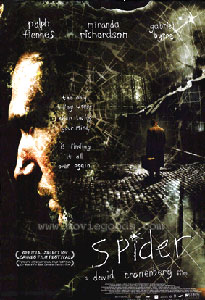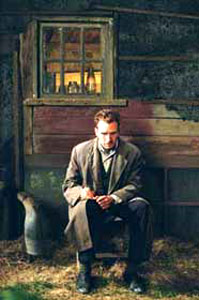 Although Spider (2002) may well be one of the two or three best David Cronenberg films on the basis of intelligent script, superb acting, & excellent cinematography, sometimes as a matter of taste it just isn't possible to like a film very much.
Although Spider (2002) may well be one of the two or three best David Cronenberg films on the basis of intelligent script, superb acting, & excellent cinematography, sometimes as a matter of taste it just isn't possible to like a film very much.
It's a David Cronenberg film after all & I might be forgiven for expecting something violent or horrific to happen. But the only things horrific here is the lonely sad lunacy of the miserable protagonist, & that protagonist's personal ugliness, shocking because underneath the repugnant character is that good-lookin' actor Ralph Fiennes.
Fiennes has made himself truly unpleasant to play an unpleasant role. It could well be called a brilliant performance. And if I'm dissatisfied with the film I'm willing to admit it's at least partially my fault. But it sometimes feels like an early draft of Slingblade (1996) without the good parts.
Set in a halfway house for the men who are seriously mentally ill, we get to know rather too well the broken, paranoic mind of the mumblingly schizophrenic Dennis Clegg, otherwise known as Spider, living under the thumb of house matron Mrs. Wilkinson (Lynne Redgrave) who Spider begins to imagine as a threat.
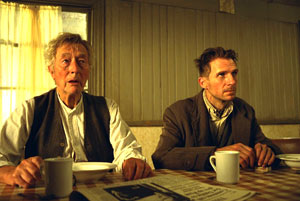 Spider is based on the Patrick McGrath novella of the same name. Spider is based on the Patrick McGrath novella of the same name.
McGrath is a brilliant literary horror writer, & Cronenberg, as director of such films as Naked Lunch (1991) inspired by William Burroughs' like-named novel, has to be regarded as a literate horror filmmaker. So I would've guessed that'd be the perfect match, resulting in a more enjoyable film than this.
I love Patrick McGrath's short stories which range from Paris Review ain't-i-the-lierati's-meow John Cheever type, to Weird Tales ain't-i-eccentric-like-H-P-Lovecraft; & in either mode, patently gay.
My tastes being what they are I most admire McGrath in the HPL mood, but in most of his moods he has an almost 1890s "Yellow Decade" decadence shifted into the modern world,.
But McGrath's novella was a head-peace that doesn't pay off all that well in & of itself, & was not at all cinematic as a work of fiction.
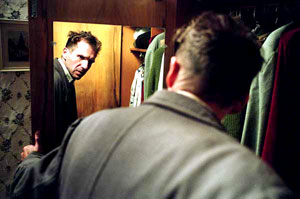 And as might've been predicted, Cronenberg turned it into something closer to an actorly stage play than a movie, & Fiennes acted it so. And as might've been predicted, Cronenberg turned it into something closer to an actorly stage play than a movie, & Fiennes acted it so.
In the novel the character of Spider is psychotic but in his own corrupt way surprisingly ordered in his interior life; we can see how his thoughts progress & develop & we can pretty easiy judge where he's gone off the rail.
But in the film he's practically mute & often hallucinatory so we can't trust anything that happens, which comes dangerously close to it not mattering what happens.
It may be the first alleged horror film that mistakes pity for horror. Spider is pitiful, & now & then he begins to build a bit of empathy, but ultimately he's just appalling & impossible to identify with or care about. I've known several schizophrenics & never known one this lacking in appeal.
Fiennes "researched" the role beforehand by visiting with institutionalized schizophrenics. But either the script, or Fiennes' perception, did not permit him to see where madness touches the heart or the capacity for fascination with madness.
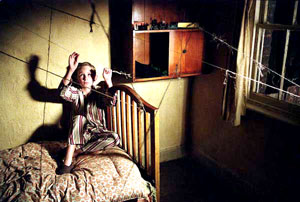 Watching the character of Spider suffering in this film is like watching an old man grunt while take a greasy shit. Watching the character of Spider suffering in this film is like watching an old man grunt while take a greasy shit.
As point of view character we have no one else to identify with. All other characters are so heavily filtered through Spider's warped perception, it's hard to know who they really are.
It's even hard to know who Spider is since we have only his perspective, which isn't rational, & he may be deluded or just lying to himself.
So did he kill his mommy, or did his father (Gabriel Byrne) kill her, & did his father take up with a wicked prostitute, or did the szhizy mind of Spider just begin to imagine mommy was a whore, just as he was imagining the house matron's shifting identity.
The film dumps out a jigsaw puzzle & then further scatters the pieces, some of which would require the novella to sort it out, but ultimately it is not the character in the novella we have on the screen.
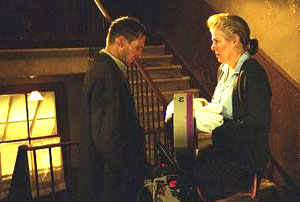 It's really only a psychological portrait, as such a mite too static. It's really only a psychological portrait, as such a mite too static.
Though we're allowed to suspect that the pathetically unpleasant Spider has violence in him, we never get to see beyond his self-loathing to any personal action. The film has no climax in the usual sense or to fulfill the expectation of cinema.
In flashbacks or hallucinatory states, Spider relives his traumatic childhood fixation on his mother (Miranda Richardson) who was killed, & confuses her with the halfway house's madam. These flashbacks invite us to psychoanalyze Spider (itself a boring exercise) & to try to understand him as fully as any warped man can be understood.
Being on the inside of Spider's head is not pictorial but emotional, so works better in the novella than in the film, where the pictorial most matters.
Underneath most, probably all Cronenberg films is a fear of sex & intimacy &/or a confusion of orgasm for death. It gives an illusion of depth to his monsters when it's so easy to see they are actually penis-monsters & vagina-monsters.
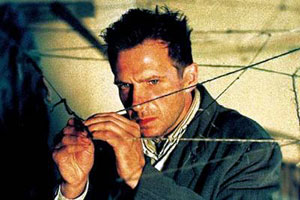 But strip away the literal monsters as has been done with Spider & there stands a guy who is simply & completely fucked up, period, the end. But strip away the literal monsters as has been done with Spider & there stands a guy who is simply & completely fucked up, period, the end.
It hardly matters if it's aedepally phobic about sex or what. It turns out not really to be all that deep. And not that entertaining.
Though I do blame my own tastes, in great part, for not liking it, I also think Cronenberg, Fiennes, & least of all McGrath have collaborated to present a character who just sits there as a distasteful entity without dimension. We wait for him to do something & he never does. We wait for somethning interesting to happen & nothing happens.
The obvious ending would've been for him to erupt in violence, which was the choice of ending for Cronenberg's A History of Violence (2005). But certainly it could've been something a little less obvious. Instead Spider demands that we imagine motion in an inert photograph that tells little in the way of story.
Continue to the next madhouse:
The Attic Expeditions (2001)
copyright © by Paghat the Ratgirl
|
